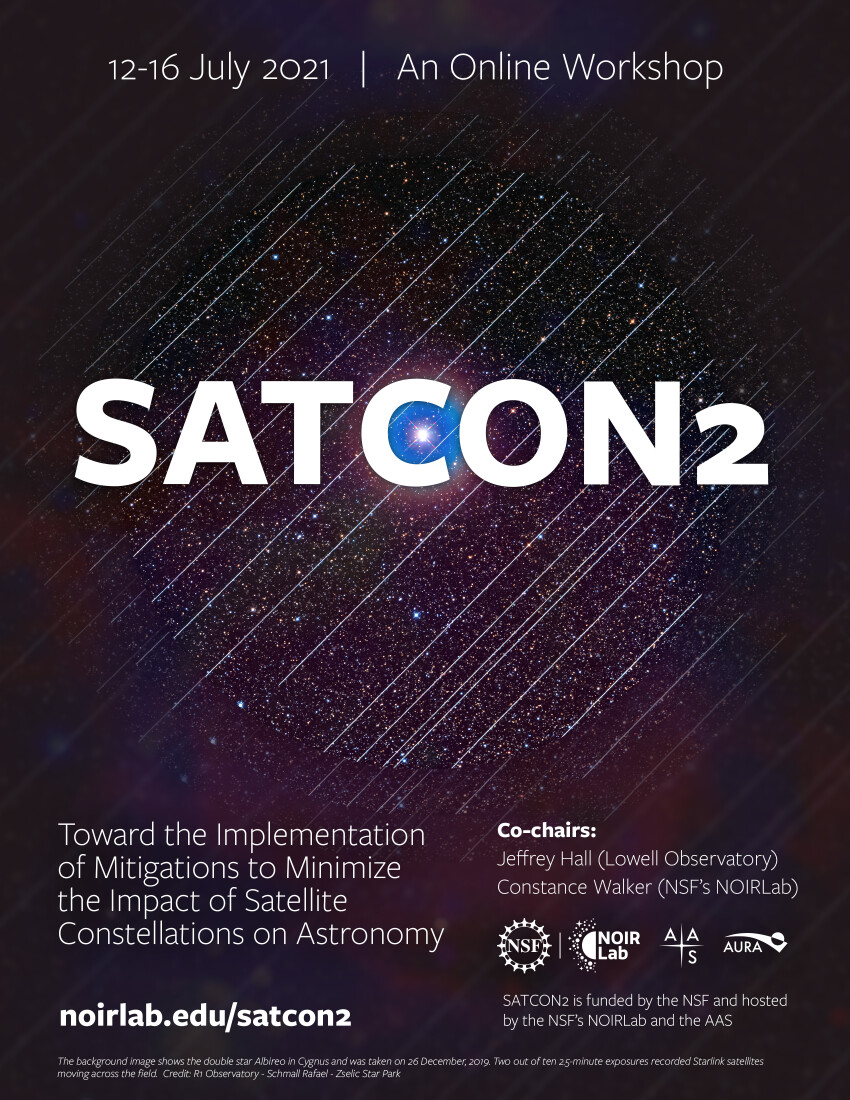Satellite Constellations 2 Workshop
In early 2020, 40 experts came together to assess the impact of satellite constellations on astronomy and to consider possible mitigation solutions . Funding was provided by NSF to NSF’s NOIRLab in partnership with the AAS. They presented their findings for discussion at the SATCON1 workshop at the end of June 2020. A year later, another group of experts are gathering to prepare for a second workshop. SATCON2, the Satellite Constellations 2 workshop, will take place online only on 12–16 July 2021 with no registration fee. We will discuss how to implement the strategies and recommendations emerging from SATCON1 to minimize the negative impacts of satellite constellations on astronomy and the night sky.
SATCON2 has three objectives:
- Define and quantify resources, metrics, and collaborations needed to implement the SATCON1 recommendations, many of which will require substantial effort and funds to address.
- Engage astronomers and satellite operators collaboratively in exploring policy frameworks and developing policy points for operations in low Earth orbit (LEO).
- Increase the diversity of stakeholders and perspectives working to address both the challenges and the opportunities for astronomers, satellite operators, and all of humanity that are created by the industrialization of space.
The Scientific Organizing Committee for SATCON2 consists of the workshop co-chairs, AAS representatives, and Working Group (WG) chairs: Jeff Hall (Lowell Observatory; co-chair), Connie Walker (NSF’s NOIRLab/IAU; co-chair), Richard Green (U. Arizona; Policy WG Chair), Meredith Rawls (U. Washington/Vera C. Rubin Observatory; Observations WG Chair), Aparna Venkatesan (U. San Francisco; Community Engagement WG), James Lowenthal (Smith College; Community Engagement WG), Jonathan McDowell (Center for Astrophysics; Algorithms WG), Robert Seaman (U. Arizona; Algorithms WG), Joel Parriott (AAS), and Kelsie Krafton (AAS).
From May through early July 2021, four working groups with experts from around the world are exploring topics relevant to these goals.
- The Observations WG will develop a plan for the implementation of Recommendations 8–10 of the SATCON1 report. The plan will define (1) optimal strategies for observations of LEO satellites, (2) the structure and resources required of an observing network of professional and amateur astronomers, and (3) the requirements for publicly accessible satellite positional information.
- The Algorithms WG will develop a plan for the implementation of Recommendations 1–3 in the SATCON1 report (though the group may examine any of the SATCON1 recommendations at its discretion). The plan will define the resources and timescale for developing the recommended applications.
- The Community Engagement WG will engage a wide set of constituents in our shared goals for dark skies and a sustainable presence in space. This reaches beyond professional astronomy and commercial use to amateur astronomy, dark skies advocacy, K–12 education, fair access to space for minoritized communities, cultural practices, and sky traditions of indigenous peoples. This group will identify key issues impacting these constituencies and lay a foundation for ongoing communication and collaboration to preserve space as a scientific, environmental and cultural resource for humanity.
- The Policy WG will review existing national policies and legislative frameworks. With the SATCON1 recommendations as context, the group will assess policy options to serve the diverse requirements of astronomy, the satellite industry, and other communities.
The working groups will present draft proposals for discussion at SATCON2, and there will be extended time allotted for discussion during the workshop sessions. Over several weeks following the workshop, the four working groups will then make revisions to their draft reports based on the workshop outcomes. The final reports, along with an executive summary to be written by the SOC, will be prepared for release by August 2021.
Registration to attend SATCON2 and discuss the working groups’ draft proposals is free and will open on 11 June. We welcome anyone working in the astronomical sciences, the satellite industry, the federal government, and related fields or organizations. We also welcome participants from the amateur astronomy and astrophotography community, from indigenous and spiritual or religious peoples with skywatching traditions impacted by satellites, and from all people who look to the starry sky for inspiration and a connection to nature and human heritage. In order to encourage frank and open discussion among all stakeholders, we are not inviting members of the news media to the SATCON2 sessions in which the four working groups and the attendees discuss the draft reports. Media members are welcome to attend the Community Engagement Working Group Town Hall on Wednesday 14 July from 3:00 to 5:30 pm EDT, as well as a concluding press briefing on Friday 16 July from 4:00 to 5:00 pm EDT. A briefing on the final SATCON2 reports will appear in a future media advisory.
Questions? Need help? If you need assistance with registration or accessing the conference please contact virtualevents@
SATCON2 is funded by the National Science Foundation (NSF) and is hosted by NSF's NOIRLab in partnership with the American Astronomical Society (AAS). Workshop co-chairs: Jeffrey Hall (Lowell Observatory) and Constance Walker (NSF’s NOIRLab/IAU).
Post-Workshop Press Conference
Media Advisory (12 July 2021): NOIRLab | AAS
Briefing Video on YouTube (16 July 2021): NOIRLab | AAS
Presentation Slides (2.8 MB PDF)
Registration
Meeting Poster
Contacts
Jeff Hall
Email: jch@lowell.edu
Connie Walker
Email: connie.walker@noirlab.edu

